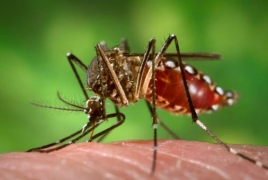
The mosquito-borne Zika virus has significantly evolved since it was first discovered in 1947, and researchers said Friday, April 15 these genetic changes could shed light on why it has the power to cause birth defects, AFP reports.
The research in the journal Cell Host and Microbe was led by scientists at the University of California, Los Angeles and the Chinese Academy of Medical Sciences and Peking Union Medical College in Beijing.
Researchers looked for individual differences between more than 40 strains of Zika virus -- 30 of which came from people, 10 from mosquitoes, and one from a monkey.
They found big differences between the Asian and African lineages of the virus, and "significant changes in both amino acid and nucleotide sequences during the past half-century," said the study.
Zika strains found in humans are more genetically similar to a strain identified in Malaysia in 1966 than that found in Nigeria in 1968, "suggesting the strains in the recent human outbreak evolved from the Asian lineage," it said, according to AFP.
All of the human strains identified in the 2015-2016 outbreak appear most closely related to the virus identified in 2013 in French Polynesia.
The team also found that a certain protein, called the pre-membrane precursor or prM, was quite different between the Asian human and the African mosquito subtypes.
"We believe these changes may, at least partially, explain why the virus has demonstrated the capacity to spread exponentially in the human population in the Americas," said senior study author Genhong Cheng, a professor at the University of California, Los Angeles's department of microbiology, immunology and molecular genetics.

